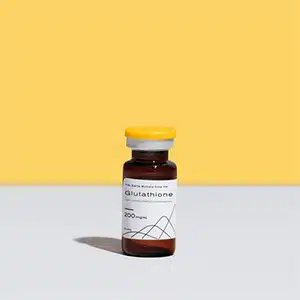Glutathione Side Effects: Everything You Need to Know
Fast Facts
- Supplementing with glutathione, an antioxidant that neutralizes free radicals, is generally safe.
- The most common side effects are GI-related.
- If you take glutathione orally, you may also notice a bad taste in your mouth.
- Glutathione injections can cause redness and swelling at the injection site.
Glutathione—also called GSH—is a powerful antioxidant found in every cell in your body. It helps keep your immune system strong and neutralizes toxic free radicals.
As researchers learn more about its potential to extend lifespan, boost immunity, improve strength and physical performance, and ward off age-related illnesses, more people are supplementing with glutathione—which is generally very safe.
“Over the past 20 years I’ve accumulated a lot of information on glutathione,” says Vishwanath Venketaraman, Ph.D., a professor of microbiology and immunology at the Western University of Health Sciences who researches glutathione. “And I haven’t seen many worrying side effects.”
Still, any time you put something in your body—whether it’s a triple cheeseburger or a supplement— you might wonder if there are any downsides.
We get it. So here’s everything you need to know about glutathione—including possible side effects.
What is Glutathione?
Glutathione, known as the “master antioxidant,” is made from three potent amino acids: cysteine, glutamate, and glycine. GSH is on the front lines of your defense against free radicals, which are the DNA-damaging compounds found in pollutants, cigarette smoke, and sun overexposure.
Glutathione is part of your body’s built-in antioxidant defense system that helps protect you from these free radicals. But if the good versus evil axis gets out of whack and there are more free radicals in the body than antioxidants, it results in a condition called oxidative stress.
Ongoing oxidative stress is linked to many chronic diseases (1) including cancer, cardiovascular disease, diabetes, osteoarthritis, and dementia.
“Glutathione can alleviate the effects of oxidative stress,” says Venketaraman. But here’s the thing: As you age, your body’s ability to produce glutathione decreases, leaving you more vulnerable to a slew of diseases and health issues (2).
Reduced glutathione levels have been linked to conditions and problems including:
- Alzheimer’s
- Cancer
- Chronic liver disease
- Cognitive impairment
- Diabetes
- High blood pressure
- Infertility
- Mental health disorders
- Multiple sclerosis
- Parkinson’s disease
- Neurodegenerative disorders
Glutathione Basics
- Glutathione is a powerful antioxidant found in every cell in your body.
- Its main job is to fight free radicals which can cause oxidative stress.
- Oxidative stress is linked to age-related conditions including cancer, high blood pressure, diabetes, and more.

Glutathione is the first line of defense against oxidative stress, processing toxins out of our body, neutralizing free radicals, increasing cellular function, and promoting cellular turnover. Now available through Hone.
Benefits of Glutathione
In addition to reducing oxidative stress, glutathione also plays other important roles in the body, including improving all of the below:
Immune health
“Glutathione is pivotal to keeping the immune system strong,” says Venketaraman. One way it does that is by supporting T cells, a type of white blood cell that attacks foreign invaders and protects you from infection (3).
Liver health
Antioxidant deficiency—including a lack of glutathione—can exacerbate cell death in the liver and lead to fatty liver disease. Animal studies suggest GSH may improve liver function (4).
Brain health
Research has found that supplementing with glutathione may give healthy adults a cognition boost (5).
Physical performance
In one small study, men who received glutathione before a workout performed better and felt less fatigued after their exercise session (6).
Glutathione Side Effects
Glutathione is “generally recognized as safe” for use in food products according to the Food and Drug Administration (FDA). But most supplements, including glutathione, could cause a reaction in some people, notes the National Institutes of Health (NIH).
Most common side effects of glutathione
According to Jack Jeng, M.D., the most common side effects of glutathione are
- Abdominal cramping
- Increased flatulence
- Loose stools
Other side effects depend on how you take glutathione.
Side effects of oral glutathione supplements
You can swallow glutathione supplements, but research is mixed on whether this is an effective way to boost your levels (7, 8) since glutathione is poorly absorbed during digestion.
In addition to the symptoms above, oral glutathione supplements can leave a bad taste in your mouth—literally.
“Glutathione has a tangy, sour flavor and a sulfur smell,” says Venketaraman. “That’s the biggest complaint I hear.”
Glutathione topical sprays can have similar smells, he notes. People who take glutathione by injection can even have a sulfury, rotten-egg taste in their mouth.
Side effects of glutathione injections
Glutathione injections can be administered directly into your muscle—typically your buttocks or upper arm—or subcutaneously, where the compound is absorbed and carried into the bloodstream.
You can self-inject glutathione at home with a prescription. The biggest benefit of taking glutathione this way is that it bypasses the digestive tract to deliver GSH into the bloodstream.
Glutathione can also be administered via IV infusion, but you need to go to a clinic for that.
In addition to the glutathione side effects above, injectable GSH use can cause redness, swelling, or bruising at the injection site.
Post-injection inflammation can happen right after your injection, or it can develop hours after the jab, says Jeng. If you experience it, it’s pretty easy to treat with products you likely already have at home:
- Cold packs can reduce pain, swelling, and itching
- OTC pain medications can curb pain and inflammation
In some cases, you could have itching, irritation, or redness at the injection site. You should seek medical attention if you develop swelling of the lips, throat or tongue, hives, difficulty breathing, fever, chills, or if lumps under the skin are raised, red, draining pus, warm to the touch, or severely painful.
A 2018 review (9) also found that IV glutathione therapy and injections could cause the following, rare effects as well:
- Skin rashes
- Stevens-Johnson syndrome, a rare but serious disorder that affects mucous membranes.
- Toxic epidermal necrolysis, a life-threatening condition where skin blisters and peels
- Thyroid dysfunction
- Kidney dysfunction
If you take glutathione and encounter any of these side effects, call your doctor immediately to avoid any further complications.

Glutathione fights against oxidative stress, which has been linked to a list of diseases. Are you ready to stop it in it tracks?
Other Ways to Get More Glutathione
Beyond injections and oral supplements, you can naturally boost glutathione levels in several ways:
Eat the right foods
Glutathione is naturally found in vegetables including asparagus, avocado, and cucumber (10). Sulfur-rich cruciferous veggies like broccoli, kale, and cauliflower are also good sources.
Get enough sleep
One small study found that people with insomnia had significantly lower levels of glutathione peroxidase (11).
Exercise
Recent research shows that exercise is helpful in maintaining or increasing antioxidant levels, especially glutathione. A combination of cardio and strength training will give you the biggest boost (12).
Who Should Avoid Glutathione?
Glutathione should be avoided if you’re currently getting chemotherapy. You should also skip it if you are sensitive to or allergic to benzyl alcohol (a preservative found in some GSH products).
The Bottom Line
Taking glutathione is generally safe and most side effects are mild. If you experience common side effects like abdominal cramping or loose stools, talk to your doctor. If you experience redness and swelling after glutathione injections an ice pack and OTC painkillers may help reduce these symptoms.
References
1. Liguori I, et al (2018). Oxidative stress, aging, and diseases.
2. Minich DM, et al (2019). A Review of Dietary (Phyto)Nutrients for Glutathione Support.
3. Mak TW, et al. (2017). Glutathione Primes T Cell Metabolism for Inflammation.
4. Yamada, H., et al. (2018). Statuses of food-derived glutathione in intestine, blood, and liver of rat.
5. Kumar P, et al (2021). Glycine and N-acetylcysteine (GlyNAC) supplementation in older adults improves glutathione deficiency, oxidative stress, mitochondrial dysfunction, inflammation, insulin resistance, endothelial dysfunction, genotoxicity, muscle strength, and cognition: Results of a pilot clinical trial.
6. Aoi W, et al (2015). Glutathione supplementation suppresses muscle fatigue induced by prolonged exercise via improved aerobic metabolism.
7. Allen J, Bradley RD. (2011). Effects of oral glutathione supplementation on systemic oxidative stress biomarkers in human volunteers.
8. Richie JP Jr, et al. (2015). Randomized controlled trial of oral glutathione supplementation on body stores of glutathione.
9. Sonthalia S, et al. (2018). Glutathione for skin lightening: a regnant myth or evidence-based verity?
10. Minich DM, Brown BI. (2019) A Review of Dietary (Phyto)Nutrients for Glutathione Support.
11. Gulec M, et al. (2012). Oxidative stress in patients with primary insomnia.
12. Elokda AS, Nielsen DH. (2007). Effects of exercise training on the glutathione antioxidant system.












